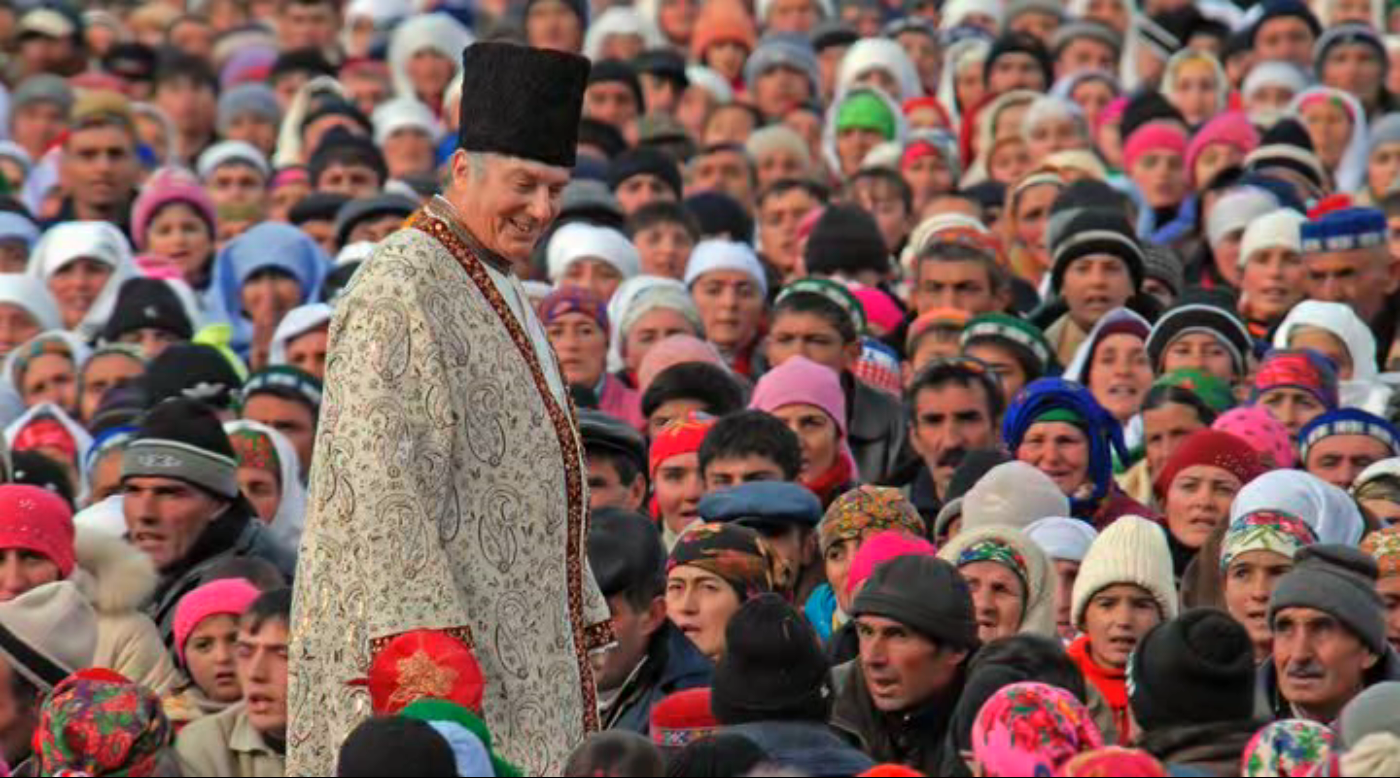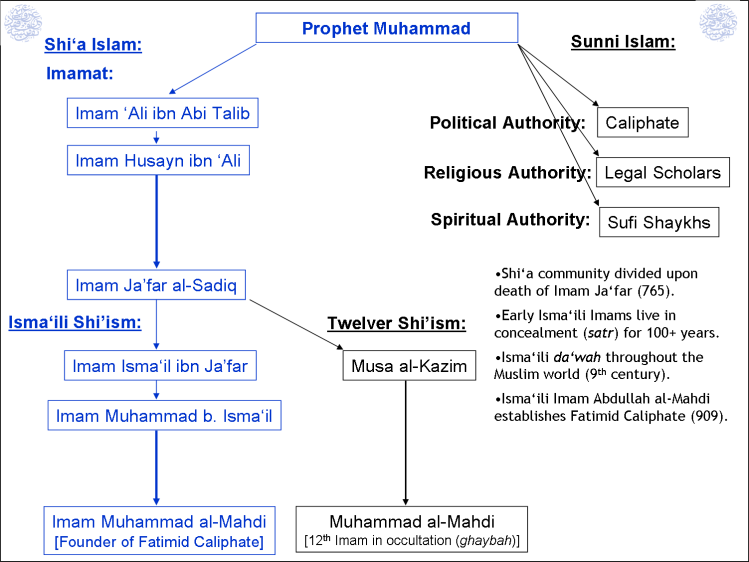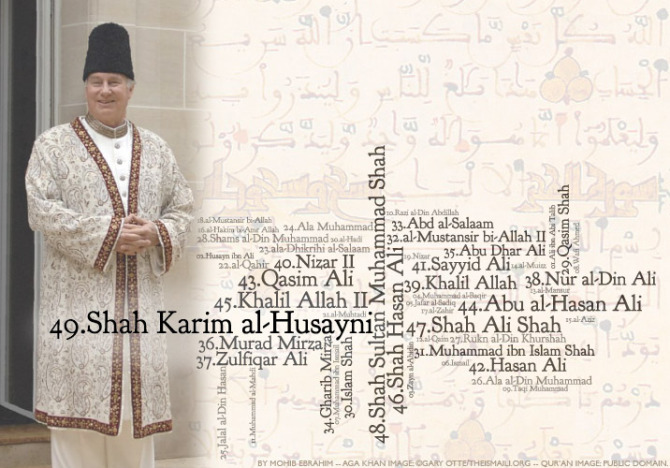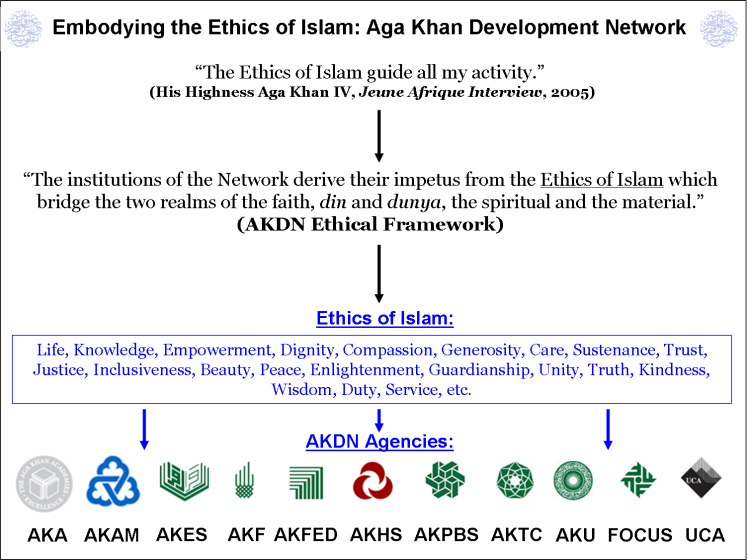In honour of the Aga Khan’s upcoming Jodidi Lecture at Harvard University, Ismaili Gnosis presents the following primer on the Aga Khan and the Shia Ismaili Muslims. We encourage our readers to share this article widely.

I have the great privilege of representing the Ismaili Imamat — this institution which has stretched beyond borders for more than 1400 years and which defines itself and is recognised by an increasingly large number of states, as the succession of Shia Imami Ismaili Imams….The Ismaili Imamat is a supra-national entity, representing the succession of Imams since the time of the Prophet[…] today the Ismailis are the only Shia community who, throughout history, have been led by a living, hereditary Imam in direct descent from the Prophet. The role of the Ismaili Imam is a spiritual one; his authority is that of religious interpretation. It is not a political role. I do not govern any land. At the same time, Islam believes fundamentally that the spiritual and material worlds are inextricably connected.
Imam Shah Karim al-Husayni Aga Khan IV (Present Imam of the Shia Ismaili Muslims)
(Address to Both Houses of Canadian Parliament and Senate, February 27, 2014, Read on NanoWisdoms)
In early Islam, the Prophet Muhammad (may God’s peace be upon him and his family) was both the temporal and spiritual leader of the believers, as testified in the Holy Qur’an. All questions concerning religious interpretations, law, ethics, theology, etc. were guided by the Prophet in person; his guidance and teaching was, for all intents and purposes, the direct representation of God’s Will and Command to the believers. [Read more at The Prophet Unveiled]
Shia Muslims hold that the Prophet Muhammad – whom Holy Qur’an 33:6 speaks of as possessing more authority (awla) over the believers than their own souls – had designated his cousin and son-in-law ‘Ali ibn Abi Talib as the master (mawla; wali) of the believers and his successor in spiritual matters.
This designation was declared on several occasions and for the last time during the Prophet’s farewell pilgrimage when the Prophet Muhammad halted the pilgrims at Ghadir Khum, quoted Qur’an 33:6 by saying “Do I not have more authority (awla) over you than your own souls” and then proceeded to declare “He whose mawla I am, ‘Ali is his mawla.” This event at Ghadir Khum is attested to by Sunni and Shia sources and narrated by 184 companions.[Read more at The Prophet’s appointment of ‘Ali ibn Abi Talib as his successor]
Shia Muslims thus believe that the spiritual and charismatic authority of the Prophet Muhammad and all of his spiritual rights and duties (with the exception of revelation) continue through the institution of hereditary spiritual leadership called the Imamat, with Imam ‘Ali ibn Abi Talib as the first Imam. Sunni Muslims believe that the Prophet appointed no direct successor and recognize the religious scholars (‘ulama) as the holders of religious authority. Subsequently, all Sufi Tariqahs came to recognize ‘Ali ibn Abi Talib as the Prophet’s spiritual successor.
The Imam for Shia Muslims is the inheritor of the Prophet Muhammad’s authority and the legitimate authority for the interpretation of Islam. This Imamat is subsequently handed down by each Imam to a successor whom he designates and appoints from among his male descendants. [Read more at What is Shia Islam]

As history unfolded, Shia Muslims came to differ over the rightful succession of Imams and traced the Imamat through different lines of descent from a particular Imam. The Ismailis are Shia Muslims who affirm that Isma‘il ibn Ja‘far was the rightful Imam after the 5th Imam, Jafar al-Sadiq, and that subsequently, the lineage of Imams continues through the descendants of Isma‘il ibn Ja‘far up to the present day. Like Sufis, Mu’tazilites and other Muslim philosophers, the Ismailis emphasize a distinction between the exoteric (zahir) and esoteric (batin) interpretations of the Qur’an. [Read more at The Succession to Imam Ja‘far al-Sadiq]

The Ismailis made major political, cultural and intellectual contributions to Muslim civilization. The Fatimid Caliphate was founded and ruled by several Ismaili Imams; great philosophers like Abu Ya’qub al-Sijistani, the Ikhwan al-Safa, Nasir-i Khusraw, Hasan-i Sabbah, and Nasir al-Din Tusi were Ismailis. For most of their history, the Ismailis were persecuted by the Sunni political establishment and endured several massacres and genocides at the hands of their enemies. [Read more at The Ismailis through History: From Persecuted Minority to Pluralist Community].
The 48th Ismaili Imam, the predecessor of the current Aga Khan, was Sir Sultan Muhammad Shah Aga Khan III (Imamat from 1885-1957); he was the founder and first president of the All-India Muslim League, founder of Aligarh University, President of the League of Nations (1937-1939), and one of the founders of the state of Pakistan. [Read more at “The Imamat and Service of Imam Sultan Muhammad Shah Aga Khan III]

Today, His Highness Prince Karim al-Husayni Aga Khan IV (b. 1936) is the 49th hereditary Imam of the Shia Ismaili Muslims (succeeding as Imam in 1957); born in Geneva and educated at Harvard, the present Aga Khan is the direct descendant of the Prophet Muhammad through ‘Ali ibn Abi Talib in the lineage of Isma‘il b. Ja‘far al-Sadiq. Today, Imam Shah Karim al-Husayni Aga Khan IV is the only living claimant to the Shia Imamat. [Read more about present Imam’s life and services at The Secret Life of the Aga Khan]
The Ismaili Muslims today are a community of ethnically and culturally diverse peoples, numbering around 15 million people spread through 25 countries, all united in their spiritual allegiance to Shah Karim al-Husayni Aga Khan IV as their present Imam; the Ismailis are the only Shia Muslim community throughout their history to have present and living Imam. [Read more at The Shia Imamat Timeline]

The role of the Aga Khan as the Ismaili Imam is to provide spiritual guidance, religious interpretation and ensure the security and quality of life for the Ismaili Muslim communities. The Aga Khan has emphasised an interpretation of Islam as an intellectual, spiritual and humanistic faith that emphasises human dignity and upholds human diversity through pluralism. The Aga Khan and the Ismaili Muslims affirm the right of all Muslim communities interpret Islam in their distinct ways and recognize the different schools and interpretations of Islam as an equally earnest endeavor to practice and express the faith of Islam. With respect to Sunni and Shia reconciliation, the Ismailis affirm that the spiritual authority of the Prophet Muhammad continues in the Imamat while accepting the worldly authority of Abu Bakr, Umar, Uthman and other Caliphs who have helped the cause of Islam, politically, socially and from a worldly point of view. [Read about the Aga Khan’s proposal for Sunni-Shia unity].
The present Aga Khan has been widely recognized for his service to humanity (data courtesy of Ismailimail): he has received 28 Title & State Decorations, 21 honorary degrees, 16 civic honours, and has delivered over 70 high profile keynote addresses including a recent speech to the Parliament of Canada. [Read about the Aga Khan’s views and interpretations of Islam at NanoWisdoms]
The Ismaili Imamat’s mandate also includes uplifting the quality of life of all the people among whom the Ismaili Muslims live; this is fulfilled through the Aga Khan Development Network (AKDN) – a collection of development agencies who seek to improve quality of life and provide relief in the areas of poverty, health, architecture, media, governance, education, finance, economic development, building, environment, etc. [Read more at AKDN website]

The work of the AKDN is not charity in the Western sense of handouts, but rather, its mission is to restore human dignity by empowering people to become self-sustaining. The work of the AKDN agencies is based on translating the Ethics of Islam into institutional endeavors. [Read more at the AKDN Ethical Framework]
List of Ismaili Muslim Websites
Official Ismaili Community: theismaili.org
The Essential Ismaili: essentialismaili.com
Archive of the Aga Khan’s Speeches and Writings: nanowisdoms.org
Official AKDN: akdn.org
Institute of Ismaili Studies: www.iis.ac.uk
Ismaili Muslim News: ismailimail.wordpress.com
Ismaili Muslim Heritage and Culture: Simerg
Ismaili Muslim Philosophy and Theology: ismailignosis.com






I personally think that His Highness is not only working on improving quality of life of ismaili community but the whole human race. Because it would be contradictory to what we are asked to practice by the Aga Khan- pluralism.
Beautiful to know of this esoteric lineage, my the Beloved continue to guide and increase your lineage, I pray….